
Your SEO company is well aware that Google processes 5.6 billion different search queries almost every day. When beginning their online purchasing experience, the vast majority of customers first consult Google, but less than 10% of websites earn any traffic from searches.
SEO services know this is a huge indicator of where you stand in Google's search rankings and might have a significant influence on the success of your company.
The process of elevating a website's position in search results through the use of both art and science is known as search engine optimization (SEO). The fundamentals shift from year to year as a result of Latest Google algorithm updates, development, and refinement.
Google does everything it can to give priority to information that is of high quality, useful, and relevant. However, they also take into account information such as the page's loading speed, photos, and videos, and the user's location.
Google's latest SEO update is modified hundreds of times a year to ensure that only the most pertinent and trustworthy results are displayed at the top of the results page.
Over the previous five years, Google has been able to cut the number of irrelevant search results displayed on a page of search results by more than 40% due to its constant dedication to improving the overall quality of the results. The latest Google SEO update is one of the key reasons for improved quality and user experience.
Even while the majority of these SEO latest updates are unnoticed, every once in a while there is one new Google update that truly rocks the boat when it comes to SEO.
Here are a few latest Google updates that you should be mindful of:

Looking for Professional SEO Services?
As it is customary, Google does not offer any specific preemptive, feedback, or otherwise, regarding how your SEO service company might get ready for or adjust to a major core upgrade.
Google update SEO attempted to instill in many people the lesson "don't try to mend the wrong things." Just before admitting that, for some, there may not be anything to cure at all."
But there has to be some way to zero in on a specific takeaway from the latest Google update and get Google's recommendations on how to proceed, right?
To answer your question, the answer is kind of yes.
When there is a Google algorithm update announcement on a significant fundamental, the company always directs users to information for search-ranking best practices. This documentation has not been updated since 2019.
In this section, Google explains that following a significant core upgrade, your SEO consultant should prioritize "focused on ensuring that you're giving the finest content you can" to get the most out of their efforts.
This requires the provision of original information, reporting, research, or analysis; a description of the topic that is substantial, complete, and comprehensive. Your SEO specialist runs insightful analysis or information that is intriguing beyond what is obvious.
If the rankings for your website have improved, your SEO company can use this as a general rule to determine whether or not your content already incorporates these best practices. If, on the other hand, your ranks have decreased, it is evident that you need to step up your content game.

No, it's not the food!
Your SEO company knows E-A-T is an acronym that stands for expertise, authority, and trustworthiness, and it is used by Google to represent the best techniques for optimizing content so that it ranks highly on their search engine.

If you are accountable for digital leads and sales, your SEO company’s objective should be to be able to say "yes" to all of these questions.
Google has stated in 2019 that numerous ranking criteria indeed incorporate the ideas of E-A-T. However, there is no actual ranking factor in Google algorithm update that explicitly embodies E-A-T.
The documents referred to earlier regarding latest Google algorithm update, encourage users to concentrate on E.A.T. in a very direct manner.
Therefore, it is reasonable to believe that there is a correlation between the ranking and content. For instance, if your SEO company marked ranking decreases after the May 2022 broad core upgrade, then your content failed to impress in terms of demonstrating E-A-T.
An SEO specialist asserted that some of the websites that were hit by the Google SEO algorithm update lost momentum on search engines as a result of their lack of E.A.T.
SEO services concluded that generalist websites were watering down their expertise as a result of SEO's latest updates since it impacted ranks for mainstream websites more than it hurt rankings for specialist websites, which cover a more specific range of topics.
Therefore, how can you protect your website's performance against any potential setbacks in the future and optimize it for E-A-T?
Your SEO company can create a Google E-A-T checklist that guarantees your content is exhaustive, authoritative (due to its concentration on a specific topic), produced by respected authors, and, where necessary, commented on by specialists.
After SEO's latest updates in May 2022, if the rankings of your website were all over the place, your SEO services would have informed you that you are not alone in experiencing this issue.
Due to the incremental nature in which Google carries out Google algorithm updates, it is not unusual for websites to see erratic ranks in the aftermath of a broad core upgrade.
It is because of the latest update in SEO that it always takes several weeks for these changes to settle, and it is also the reason why we observed volatility for numerous days in the mid-2021 update and the November 2021 update.
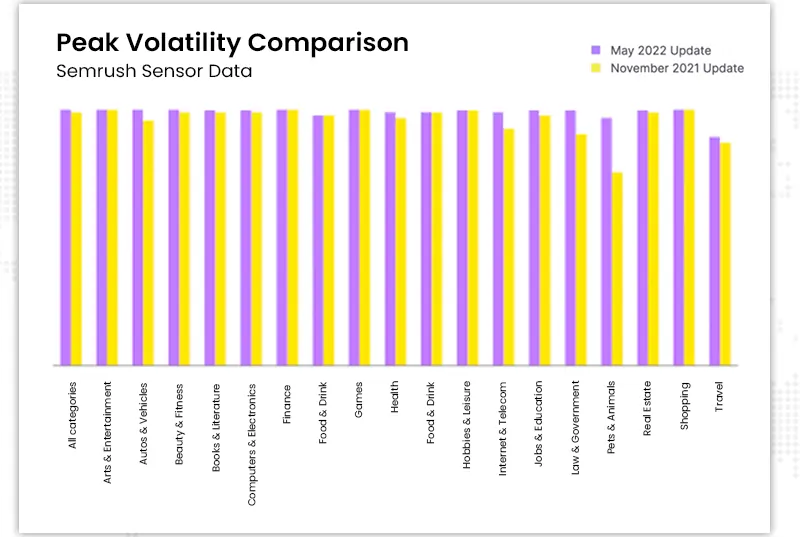
However, the most recent information from May 2022 indicates that there was a shorter but more intensely turbulent period that has since leveled off.
Even though things have settled down, this is relevant because the data may be able to predict possible long-term repercussions that have not yet occurred.
The question is, what do you and your SEO services know?
According to the two graphs below from Semrush, all of the industries, except the real estate market, had significantly lower ranges of rank volatility compared to what was seen in the past, but also larger peak volatilities.
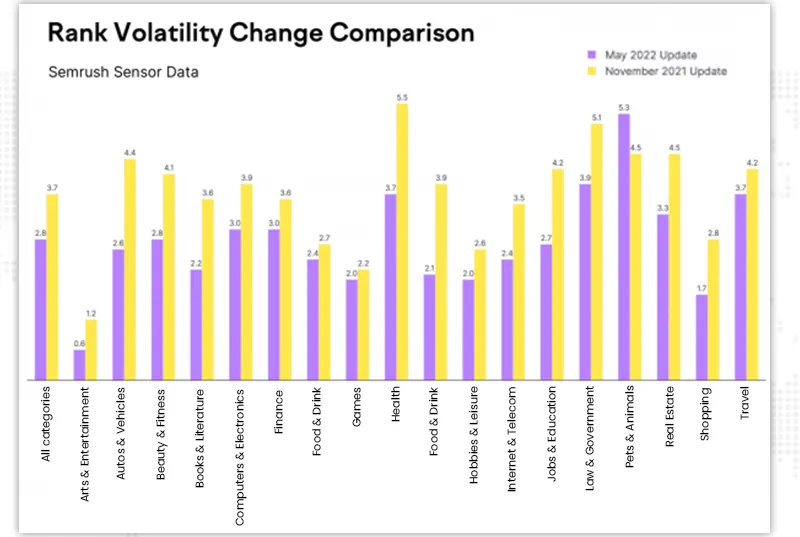
Websites in all major industries outside of real estate had less short-term volatility in search engine results after Google's May 2022 SEO latest updates compared to Google's previous broad core update in November 2021.
When compared to the wide core update that took place in November 2021, the May 2022 Google algorithm update resulted in a higher or equally high short-term peak instability in the search engine ranks of all of the key verticals' websites.
Because of this constant, it is challenging to identify individual consequences caused by industries.
When your SEO services combine the consistency with the intensity of the volatility, it is more likely than anything else to be stronger evidence that Google is both enhancing and accelerating the rollouts of these updates.
This is the case regardless of whether or not any other factor is involved.
Could the drop in ranks be explained by a bias against websites written in languages other than English, as the remark implies is possible?
It's not impossible but bears in mind that factors like that don't always play the same role in different fields. All of this culminates in the conclusion that the best practices for the future are not specific to any one industry.
Content is essential to every industry, and Google applies the same content-related best practices to every sector it serves including Google SEO keyword ranking.
Implementations, messages, and use cases may be different, but the fundamental principles used to evaluate value will remain the same.
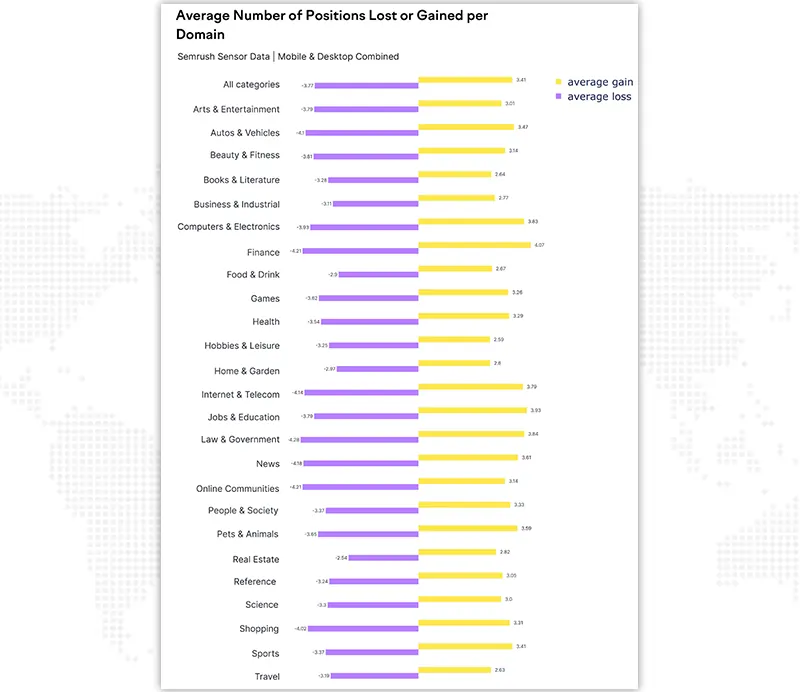
After the comprehensive core change that Google implemented in May 2022, the majority of the most important verticals had equal amounts of short-term average gains and losses in their search engine results.
There was more or less high-level symmetry between average gains and losses in search-engine ranks across the majority of industries, with a few notable exceptions including Arts & Entertainment and Books & Literature.
To what end?
This investigation lends support to the notion that valuable material that has been subjected to quality checks—including E-A-T as well as branding rules to persuade your audience—is applicable and applicable everywhere.
Snippets! Do you love them? Your SEO company would be overjoyed to inform you of some very good news!
This is correct; the latest Google update that took place in May 2022 has unquestionably affected a variety of snippet categories for SERPs, such as FAQ snippets and highlighted snippets.
What exactly did this appear to be? And how will this influence your company's search engine optimization efforts?
Let's begin with some samples from the FAQ. Yes, those annoying little buggers that appear underneath the webpage listings on search engine results pages (SERPs) and deliver brief, specific solutions to variations of user queries.
The fact that frequently asked questions (FAQ) snippets on search engine results pages (SERPs) have climbed from 22% to 27% of inquiries is a curious effect of the comprehensive core change that was reported on by an SEO company.
This indicates that frequently asked questions are appearing on Google Search nearly 23 percent more frequently than they were previously. That is a tremendous deal!
Indeed, the data from the source frequently asked questions and how-to snippets together.
The findings, on the other hand, have been substantiated by third parties, including several SEO services.
What does this have to do with anything?
Because it is another feature on the search engine results page (SERP) that consumers can click on to find an answer to their question, frequently asked questions (FAQ) results purportedly provide Google the ability to steal clicks from your website.
However, they also enable your web pages to generate more clicks by providing credibility and knowledge to your SERP listings, which in turn increases the likelihood that users will select your listing.
Additionally, if you want your material to get to the top of search results, you need to have high-quality content that is suitable for FAQ snippets. Only then will you be able to qualify for an appearance in the FAQ?
Your SEO company will ensure that the content of your frequently asked questions section on your website is marked up with relevant structured data.
You should also work on improving the content by including material that is appropriate for questions relating to the desired key terms.
SEO services conduct keyword research or even something as straightforward as evaluating queries categorized as "People Also Ask." After doing an in-depth analysis of several case studies, Gabe concluded that "Google shares dynamic and accurate search results with FAQ-specific results."
What about excerpts that are highlighted? Take into consideration the comment made by the SEO consultant in the tweet that was cited before, which stated that there have been "huge variations with highlighted snippets."
In any case, an SEO expert concurred with their observations and pointed out that the May 2022 broad core update brought about a discernible "spike or dip in highlighted snippets."
This indicates that all of the information items that appear at the top of search engine results pages (SERPs) above the usual listings, such as highlighted bullets, paragraphs, lists, tables, or videos, have either seen significant gains or losses.
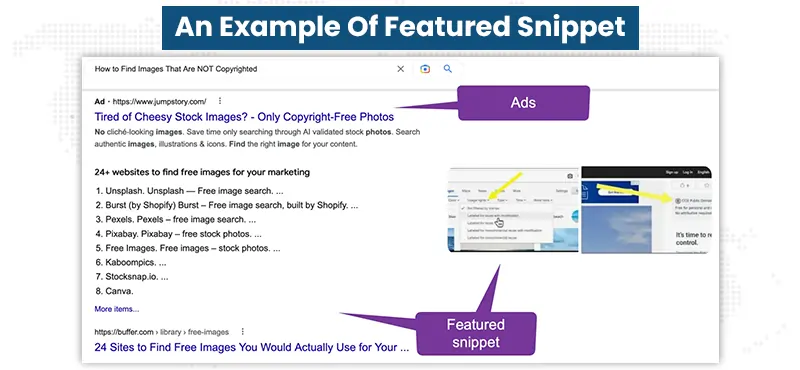
And this is a huge thing for a lot of companies because featured snippets drive a reasonably large percentage of organic traffic to their websites.
An SEO firm elaborates by saying that websites that are no longer "considered as high quality/relevant" can be badly impacted by a broad core change and so lose their highlighted snippets.
So, what are some good options for you? Check your featured snippets; you can simply track them with tools such as Ahrefs, Semrush, or Google Search Console if you are not already doing so.
As a result of the upgrade that took place in May 2022 for the wide core, your SEO services will know where and how to increase the quality of your material if you discover that you have lost any.
Videos, content that has been specialized, and search-intent matching are the primary beneficiaries after the Google algorithm update that took place in May of 2022.
Okay, that was probably not the most exciting statement to read out loud, so let's break them down into their parts.
An SEO company which is the leading eCommerce publishing platform in Germany produced these studies by cross-referencing data. This SEO agency is the market leader in Germany.
With this data, they can draw some reasonably consistent and convincing conclusions regarding SEO after the broad core change in three areas that have the potential to generate incredible content ideas by content marketing services for your company.
Since quite some time ago, SEO services have been praising what they call the "rise of video."
SEO services need to travel back that far to get to the moment when experts first heard a now-former employer of mine exclaim to the audience at an industry event that "videos are the future—and they're here!
There doesn't seem to be a lot of variety in the meta titles for these web pages, which have been created over several years, does there?
Earlier, it was simple to produce material that was only somewhat relevant to any given subject, and one could easily achieve high search-engine results by covering these subjects in extensive detail.
Websites that were similar to encyclopedias and databases websites, and other sites of a similar nature) we are experts at doing this.
These kinds of websites, in an SEO company, "contain pages for nearly any topic that appears relevant depending on term frequency-inverse document frequency" (to get content information from an index).
What exactly does this entail, and why exactly is this a cause for concern?
When search engines retrieve data, term frequency-inverse document frequency analyzes the link between the total amount of keywords and the degree to which those terms are dispersed throughout the content.
These websites were using this strategy to rank for queries, while not going into sufficient depth to match the more specific goals that were driving the requests.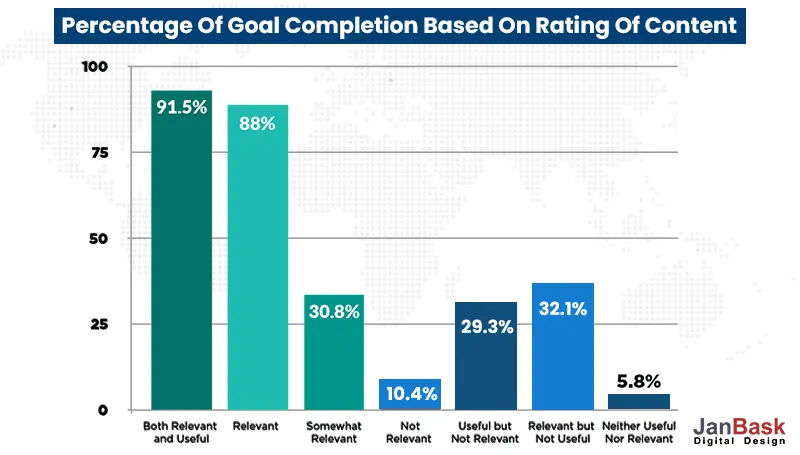
The Google algorithm update in May 2022 is putting a damper on the ability of generic content about a given topic to rank well in search results, even if the content does not precisely address a search query.
Therefore, the key to success is to emphasize the contextual relevance of your content, to deemphasize the importance of exact keyword-matching (particularly keyword-stuffing!), and to provide genuine value in response to a search query.
It is not that difficult.
Ask yourself this question with complete sincerity: does the content of your webpage provide helpful value that is relevant to the scope of the page and representative of typical queries that would lead people there?
If this is the case, you have accomplished what is known as "search-intent matching," which is when the purpose of the user of the search engine can be deduced from the query they enter into the search bar.
It's time to sit back and watch the organic traffic to your website soar!
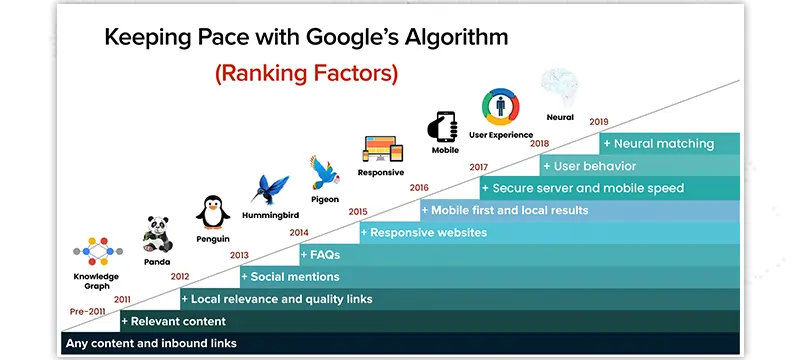
You don't need to be current on every single Google update. However, being aware of new features, shifting possibilities in the SERPs, and major Google updates provides critical context to what you are seeing in your site's performance statistics.
To acquire the latest information about the Google Algorithm Update, all you need to do is get in touch with JanBask Digital Design.
1. What Is The Latest Google Update?
On July 27, 2022, Google released an upgrade to its product review algorithm that was made in July 2022. The current Google algorithm update is the fourth in a series of improvements that have targeted product reviews. Twitter was chosen by Google as the platform for making official announcements. This Google algorithm update went live on July 27, 2022, and it should be completely rolled out during the next two to three weeks.
2. How Many Times A Year Do Google SEO Updates?
In a given year, how many times does Google conduct an update to its algorithm?
The majority of industry professionals believe that Google modifies its search algorithm between 500 and 600 times every single year. That comes out to anywhere between once and twice a day on average. Although the vast majority of these adjustments do not fundamentally alter the landscape of SEO, some updates are significant and may influence the way we approach writing for SEO.
3. How Long Does It Take For Google Algorithm Update To Work?
Assuming that you are generating high-quality content and optimizing your site for search engines, it may take somewhere between three to six months for your website to appear on the first page of Google's results. If there is a lot of competition in your industry or if you have not optimized your website, it could take anywhere from six months to a year before you see any returns.
4. What Is A Google Penalty?
A website may receive a Google penalty if the content of the site is found to violate the marketing practices that Google has mandated for all websites. This penalty can occur as a result of an upgrade to the Google page ranking algorithm or a manual review that shows a website page utilized "black hat" SEO practices. Both of these scenarios have the potential to affect a website's search engine rankings.
C
This Google Algorithm concept was unclear, thanks for sharing this blog.
F
My friend recommended your services, and I am glad to reach out to you.
Z
Can you share blogs on each Google algorithm update?
E
This blog gave me insights on the latest Google update.
W
Great work team, I am excited to connect with you.
D
Your brilliant SEO Google update knowledge has helped my firm